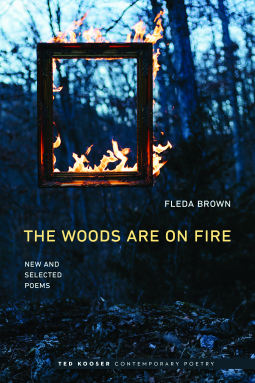
The Woods Are On Fire
New and Selected Poems
by Fleda Brown
This title was previously available on NetGalley and is now archived.
Send NetGalley books directly to your Kindle or Kindle app
1
To read on a Kindle or Kindle app, please add kindle@netgalley.com as an approved email address to receive files in your Amazon account. Click here for step-by-step instructions.
2
Also find your Kindle email address within your Amazon account, and enter it here.
Pub Date Mar 01 2017 | Archive Date Mar 31 2017
Description
The Woods Are On Fire is Fleda Brown’s deeply human and intensely felt poetic explorations of her life and world. Her account includes her brain-damaged brother, a rickety family cottage, a puzzling and sometimes frightening father, a timid mother, and the adult life that follows with its loves, divorces, and serious illnesses. Visually and emotionally rich, Brown’s poems call on Einstein, Shakespeare, Sophocles, Law and Order, Elvis, and Beethoven. They stand before the Venus de Milo as well as the moon, as they measure distances between what we make as art and who we are as humans. In wide-ranging forms—from the sestina to prose poems—they focus on the natural world as well as the Delaware legislature and the inauguration of William Jefferson Clinton.
The Woods Are On Fire includes nearly fifty new poems, along with poems selected from seven previous books, showcasing an influential American poet’s work over the last few decades.
Advance Praise
Available Editions
| EDITION | Other Format |
| ISBN | 9780803294943 |
| PRICE | $19.95 (USD) |
| PAGES | 300 |
Links
Average rating from 15 members
Featured Reviews
 Michelle S, Reviewer
Michelle S, Reviewer
The Woods Are On Fire is among the largest poetry anthology collections by Fleda Brown (1944-). Many of the works have been previously published. Driving With Dvorak: Essays On Memory and Identity (2010)-- Browns memoir may be helpful reading for readers unfamiliar with her poetry and writing. Brown earned her PhD in American Literature at the University of Arkansas, taught as professor emerita at the University of Delaware, and is a member of the teaching staff at the low residency Rainier Writing Workshop at PLU in Tacoma, Washington.
With her observational writing style, Brown invited her readers to explore and consider different ways of seeing the world around us. The themes of nature near the Mississippi River are featured in the first section. Wildlife particularly varieties of species of birds, fishing, the shucking of the oystermen, canoeing, gardening, pets, and life by the river in a small Southern town are introduced. It seemed family life may not have been very happy, with much time alone for thought, reflection, and care not to upset the fragile balance of family relationships. “To Mark, My Retarded Brother Who Lived 20 Years and Learned to speak 200 Words” a later poem involving her brother is called “My Father Takes My Retarded Brother Sailing”. (The derogatory term “retarded” is no longer used as it was in the past, today the terms “disabled” or “intellectual disabilities” are used instead). The definite descriptions of family life were mentioned in passing. Browns father, a quiet, mostly silent fisherman, particularly evident in: “My Father and Hemingway Go Fishing”.
There was much inspiration drawn from the inclusion of famous people: “Einstein on Mercer Street” is the longest interesting story poem of this theme. Emily Dickenson, Elizabeth Bishop, Georgia O’Keeffe, and James Joyce were also uniquely featured. Naturally, most of the fan poetry is about Elvis. From the earliest verses--Elvis stepped away from the family outhouse, Brown kisses his picture on a poster: “Memphis Discovers Elvis” – “Elvis Goes Into The Army” – “Shaking Hands With Nixon” –“Elvis Sings Gospel” In addition, Brown wrote about touring “Graceland” – “Elvis’s Bedroom” – “Lisa Marie’s Favorite Chair” – along with Elvis sightings at a local market, all highlight Browns fandom and dedication to Elvis’s memory.
It seemed to be accidental that Brown revealed she had been married three times, her former husband’s wife dying alone. Without details, this is only a sad quick fact. In a similar way Brown recalled her chemo-therapy presumably related to a cancer diagnosis: “Taxol” – “Cancer Support Group with Painting By Monet” – “Snoring”. With limited information, the meanings of many of the poems seem nearly abstract, the poetry of things unseen (including the poetry of nature in the last section) are left to individual interpretation. “The Poem I Was Going to Write” of the anxiety of influence, concern with social media/FB, overall the vibe of the poetry centered on all kinds of subjects, seemed to pick-up towards the end of the book, closing on a satisfying note. ~ With thanks to the University of Nebraska Press and NetGalley for the DRC for the purpose of review.
 Bonnye Reed F, Reviewer
Bonnye Reed F, Reviewer
I received a free electronic copy of this book of poetry from Netgalley, Fleda Brown Jackson, and University of Nebraska Press in exchange for an honest review. Thank you all, for sharing your hard work with me!
This was an exceptional collection of free verse, on subjects close to my heart. We New Mexicans consider George O'Keefe as one of our own, so of course all of those poems were read and re-read and gossiped over. Those poems concerning surgery, and the hospital, also rang true, and those concerning prayers. Cleone must have been very loved. She, too, is in my prayers.
Altogether, an excellent read. Thank you again for sharing.
 Bill C, Reviewer
Bill C, Reviewer
The words in Fleda Brown’s The Woods Are on Fire: New and Selected Poems, like the many birds that appear in its pages, circle round and round many of the same themes and images. And as with those birds, they bring with them a beguiling admixture of the precise and the indefinable, of the flesh and blood and bone realities of life and the abstractions of transcendent longings.
Nature is one of those broad-based themes, the collection filled with water, flowers, fish, and yes, birds. They reside in the poems sharply delineated and singularly particular, never just the things alone. Never just flowers but petunias, tulips, Lady Slipper, chicory, trillium. Never just birds but swans, anhingas, purple gallinules, cedar waxwings. Not any water, but the Mississippi, the Juniata, the Clam; Lake Michigan and Central Lake. There is always the sense of the sharp-eyed observer yes, but the poet’s eye bolstered as well with a sense of familiarity, of place and ritual, the precision arrived not just via clear sight but through the repetition of events long layered into memory and then reclaimed for the page. That recall evokes a human presence, with Brown typically presenting nature not as removed from the human world but as part of it; people are swimming the lakes, canoeing or kayaking the rivers, driving by the flowers. They’re mourning the “swollen-trunk maple [that] came and leafed and are gone, worrying over the fawn “the size of a cat with long legs [that] was left in the tall grass” by its mother, and even “put [ing] out a spoonful of peanut butter for the mouse.” Nature is rarely just “there,” but instead is encountered, sometimes in all its messy fleshiness—the “oozing” guts of a worm threaded on a fishing hook or the “satisfied squirming” of maggots—sometimes in all its incomprehensible glory, as with the swan “who came huge, sudden as if straight at me, muscular wingtips skimming the water . . . what did either of us know our end . . . ?”
Longing, as noted, is another thread that runs throughout the pieces, longing of all sorts: for love, for sex, for wisdom, for youth, for cures for illness. The longing that comes with adulthood—“I wish my childhood would precisely reconstruct itself so I could see what I didn’t see,” and the recollected desire of adolescence, as when a group of middle-school students try to comprehend the marriage of two of their teachers while they sit “In homeroom, the smell of humans, rank, sprouting, yet this hope for us all.” Frequently the speaker displays sympathy, or at least empathy, for those who desire: “You think the fat woman who cried didn’t know what they cried for when he [Elvis} died?” “Nobody wants anything more than they want home—what home means.”
Connected to the thread of longing, often, is a keen sense of the passage of time, marked by anniversaries and weddings, the breakdown of the body (Elvis: “”Excuse me . . . The older I get, the more often I have to pee.”), past marriages, the deaths of people we know. Time is marked within the poems but also by the poems, as the reader moves with the speakers through nearly all the stages of life: childhood, early and late adolescence, middle age, late adulthood, the end of life; sometimes with the speaker herself in these stages, other times with the speaker observing or recollecting those closest to her—mother, father, grandfather, sister, brother child.
Some poems are more meta in nature, usually, perhaps always wearing their nature on their sleeve, upfront that here is a poem about making poetry, as with “The Poem I was Going to Write.” Politics is another common subject, especially in the later poems, which see the speakers musing on bombs dropping or on lists of those fallen in battle.
The language is precise and controlled throughout, varied rhyme and sound enhancing the poems without calling undue attention to themselves. In the short space of the close of “Felled Tree,” for instance:
I have left the vertical space open
For the ur-tree, the canonical vision
That will take your place, even the stigmata
Your bulged and arthritic joints, the
Whither of your leaving, the grand word
Whither standing where you were
Brown employs a semi-end-rhyme (open-vision), internal rhymes (vertical-ur, grand-standing, space-place), assonance (space—take—place/have-that-grand-standing), and a final two lines whose rolling alliteration (whither, word, where, were) leaves the reader wanting another “W” to come; but it never does, leaving an empty space to mirror that of the titular tree.
With subject and style, depth and dexterity, The Woods Are on Fire presents a poet equally at home in mind and body, in the human and natural worlds, in times present and past, and one who makes a confident guide through their intersecting spaces.
 Bookseller 45580
Bookseller 45580
3.5 A life in poetry. Beautiful poems, my favorites, on the natural world and the things, animals and Birds found within. Many personal poems, following along with her life, meaningful. Some quite long, and as expected some I found more interesting than others. One of my favorites was about loons. I do like reading poetry at times, find it relaxing and insightful and this collection did just that.
ARC from Netgalley.






